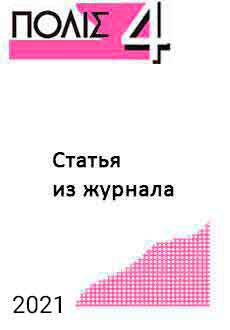Online shop of "Polis. Political Studies" Journal
We in the world, the world in us
Martyanov V.S. In Search of Another Mainstream. – Polis. Political Studies. 2021. No. 4. P. 112-131. (In Russ.).
mainstream, liberal consensus, hegemony of the West, limits of growth, multipolar world, legitimation, rent society, neo-feudalism, neopatrimonialism, soft power.
The “end of history” actually turned out to be the beginning of the end for the global hierarchy of the West, centered around societies which identified themselves as liberal market democracies. At present, one can observe a consistent weakening of Western economic, political, and military hegemony, accompanied by the rise of non-Western centers of power. The world is again moving towards conflict multipolarity, and this movement is determined by a number of background factors affecting all contemporary societies. This is the achievement of several factors: the limited capacity of global markets alongside the model of endless economic growth, the crisis of societies’ class stratification, the strengthening of inequality, and the crisis of social policy focused on the labor and military usefulness of citizens. These changes allow us to formulate two interrelated theses developed in the article. The first thesis is that the globally changing economic and political ontology, which can be described as the rental turn, no longer can be convincingly described from the mainstream perspective, one of the main tasks of which was to ideologically legitimize Western hegemony. The second thesis is that the concepts of contemporary societies – running alternative to the neoliberal mainstream – that do not reveal in them the qualitative political, economic, and cultural differences lying at the foundation of the intellectual and institutional hierarchies are becoming increasingly relevant. Alternative descriptions are built primarily on the reassessment of capitalism, democracy, and market exchanges as an indispensable core of modernity, framed in the form of the liberal consensus. Under the public ideological variations of the liberal consensus, hidden mechanisms can be found, revealing themes of power-ownership, rent-seeking behavior, oligopolies, inherited power, and economic policy, far from the principles of self-regulated market competition. The neoliberal mainstream continues to classify these trends as archaic, traumatic, and unworthy deviations that need to be brought back to normal. The paradox is that liberal democracy itself ceases to be the norm, turning into a specific ideal of the political system, less and less attainable even in Western societies, where this ideal was considered to be realized in practice. The article proves the fallacy of the negative moral assessments of trends inconvenient to the mainstream. It is argued that fundamental changes, initially assessed within the narrow framework of liberal market modernity as archaic (neo-feudalism, neopatrimonialism, rent-estate society), will only increase ontologically. They will lead to the formation of a new consensus among researchers about the value-institutional economic and political normality of 21st century societies against the background of reaching the natural limits of capitalism and leveling Western hegemony. The new normality appears as a rent-estate society in an adaptive market shell, differing only in its relative thickness.
 English
English Русский
Русский

Reviews
There are no reviews yet.